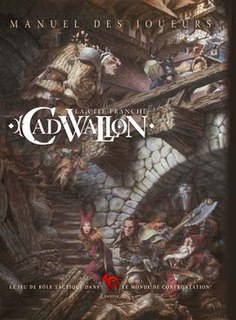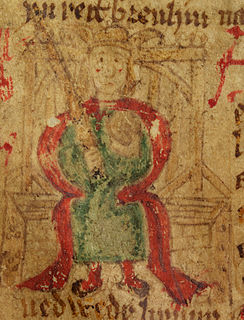Osric was a King of Deira in northern England. He was a cousin of king Edwin of Northumbria, being the son of Edwin's uncle Æthelric of Deira. Osric was also the father of Oswine.
Eanfrith (590–634) was briefly King of Bernicia from 633 to 634. His father was Æthelfrith, a Bernician king who had also ruled Deira to the south before being killed in battle around 616 against Raedwald of East Anglia, who had given refuge to Edwin, an exiled prince of Deira. His mother was Acha of Deira.

The Battle of Hatfield Chase was fought on 12 October 633 at Hatfield Chase near Doncaster. It pitted the Northumbrians against an alliance of Gwynedd and Mercia. The Northumbrians were led by Edwin and the Gwynedd-Mercian alliance was led by Cadwallon ap Cadfan and Penda. The site was a marshy area about 8 miles (13 km) northeast of Doncaster on the south bank of the River Don. It was a decisive victory for Gwynedd and the Mercians: Edwin was killed and his army defeated, leading to the temporary collapse of Northumbria.

The Battle of Heavenfield was fought in 633 or 634 between a Northumbrian army under Oswald of Bernicia and a Welsh army under Cadwallon ap Cadfan of Gwynedd. The battle resulted in a decisive Northumbrian victory. The Annales Cambriae record the battle as Bellum Cantscaul in 631. Bede referred to it as the Battle of Deniseburna near Hefenfelth.
Cadafael ap Cynfeddw was King of Gwynedd. He came to the throne when his predecessor, King Cadwallon ap Cadfan, was killed in battle, and his primary notability is in having gained the disrespectful sobriquet Cadafael Cadomedd.

Cadfan ap Iago was King of Gwynedd. Little is known of the history of Gwynedd from this period, and information about Cadfan and his reign is minimal.
Iago ap Beli was King of Gwynedd. Little is known of him or his kingdom from this early era, with only a few anecdotal mentions of him in historical documents.
Cadwallon ap Einion, usually known as Cadwallon Lawhir and also called Cadwallon I by some historians, was a king of Gwynedd. He was a son of Einion Yrth and Prawst ferch Deithlyn.
Cadwallon ap Ieuaf was a King of Gwynedd.

Cadwallon is a role-playing game (RPG) published by Rackham in book form in 2006. It is set in the fantasy world of Rackham's previous game Confrontation. A tactical role-playing game, it is played with miniatures. As with most of Rackham's products, Cadwallon was originally written in French and later translated into English.
Cadwallon ap Madog was the son of Madog ab Idnerth who had died in 1140, while Idnerth was a grandson of Elystan Glodrydd who had died in around 1010 and had founded a dynasty in the Middle Marches of Wales, in the area known as Rhwng Gwy a Hafren.

Armes Prydein is an early 10th-century Welsh prophetic poem from the Book of Taliesin.
According to some early medieval sources, the Siege of Exeter or Siege of Caer-Uisc was a military conflict that took place in or around 630 CE, between the Mercians, led by Penda of Mercia, and the Britons occupying Caer-Uisc (Exeter) in the kingdom of Dumnonia. Penda is said to have laid siege to the town until the exiled British High King Cadwallon of Gwynedd, arrived to confront him. An alliance between British and Mercian forces followed, secured by Cadwallon's marriage to Alcfrith, Penda's sister, and they marched north to face the armies of Northumbria at the Battle of Cefn Digoll.
Cadwallon ap Gruffydd was the eldest son of Gruffudd ap Cynan, king of Gwynedd.

Avalokitesvara, also known as Bu Ken Qu Guan Yin, is a 2013 Chinese religious film directed by Zhang Xin. It is loosely based on a legend about how Mount Putuo in China's Zhejiang Province became the bodhimaṇḍa of the bodhisattva Avalokiteśvara, who is better known in Chinese as Guanyin. The film starred Li Chun, Nie Yuan, Nakaizumi Hideo, Siqin Gaowa, Nakano Ryoko and Mou Fengbin in the leading roles. It was shown at the 37th Montreal World Film Festival in 2013 and was named one of the four World Greats.







